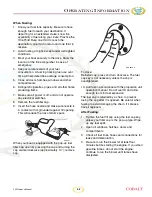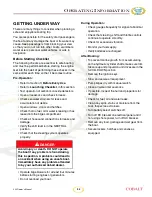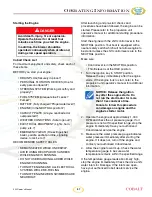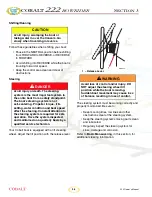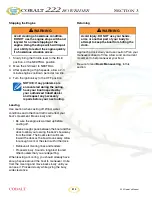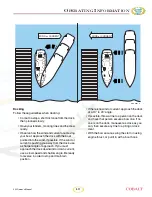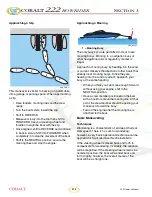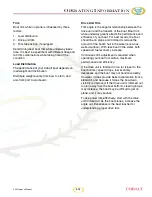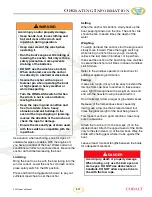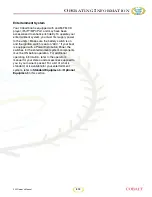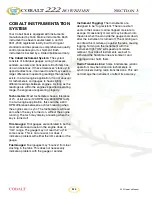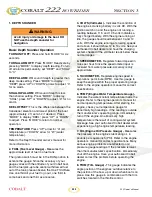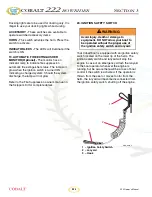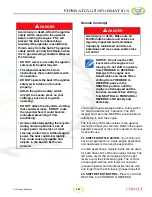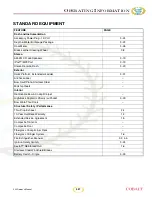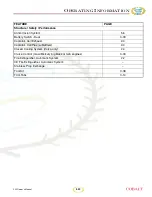
Cobalt_OM_preprint_shell.fm Page 1 Wednesday, March 1, 2006 5:39 AM
222 Owner’s Manual
3
-
17
O
PERATING
I
NFORMATION
Use caution when anchoring. Look for signs of
underwater pipes or cables. With the engine off,
you have no control of the boat. Water and wind
conditions will affect an anchored boat. Be sure the
anchor will hold before leaving the boat.
Lowering
Bring the boat to a stop with the bow facing into the
wind or current. Lower the anchor. On dash control,
place safety switch in the ON position.
Press and hold the toggle switch down to pay out
sufficient rope/chain to set the anchor.
Setting
When the anchor hits bottom, slowly back up the
boat, keeping tension on the line. The anchor line
should be five to seven times the depth of the
water.
Weighing
To weigh (retrieve) the anchor, start the engine and
slowly move forward. Press the toggle switch up
while taking in anchor line as you go. Carefully
retrieve the last meter (36 inches) of rope/chain,
then seat the anchor in the bow fitting. Use snubber
to secure the anchor at all times in case of windlass
clutch failure.
Refer to the windlass operator’s instructions for
additional operating information.
Towing
If seas are rough, it may not be easy to extend the
tow line from one boat to another. In these cases,
use a light throwing line with a weight on one end
and with the heavier towing line secured to it.
Do not attempt to tow a larger or grounded vessel.
Because of the tremendous stress caused by
towing, use a tow line that is rated at least four
times the gross weight of the boat being towed.
Tow ropes must be in good condition, free of any
cuts or abrasions.
Attach the tow line (2) to the bow eye (3) on the
disabled boat. Attach the opposite end of the bridle
only to the stern cleats (1) of the tow boat. Wrap the
bridle with chafing gear where it rubs against the
boat.
Leave at least two boat lengths between the boats
for adequate movement.
A
WARNING
Avoid injury and/or property damage.
• Keep hands, feet, loose clothing and
hair well clear of the winch and
rope/chain during operation.
• Keep clear view of the winch when
operating it.
• Run the boat’s engine while raising or
lowering the anchor. Not only is this a
safety precaution, it also prevents
draining of the batteries.
• DO NOT use the winch as a bollard.
When anchored, secure the anchor
line directly to a bollard or deck cleat.
• Secure the anchor with a rope or
fastener pin when operating the boat
at high speed, in heavy weather or
while transporting.
• Turn the WINDLASS switch off when
the winch is not in use and before
leaving the boat.
• Keep the rope in good condition and
free from twists, knots, heavy
abrasions and salt buildup. In the
event of the rope slipping or jamming,
reverse the direction of the winch and
check the rope for damage.
• Ensure the size and type of chain used
with this switch is compatible with the
rope/chain.
A
DANGER
Avoid injury, death or property damage.
When towing, only use the bow eye and
stern eyes. DO NOT use deck cleats or
handrails. DO NOT allow anyone to be in
line with the tow rope.
Содержание 222 BOWRIDER
Страница 1: ...COBALT BOATS Owner s Manual 222 ...
Страница 8: ...vi 222 Owner s Manual COBAL T 222 BOWRIDER NOTES ...
Страница 28: ...1 20 222 Owner s Manual COBAL T 222 BOWRIDER SECTION 1 NOTES ...
Страница 97: ...222 Owner s Manual 4 3 SYSTEMS FUEL ROUTING Engine FUEL TANK COB_0025_A ...
Страница 121: ...222 Owner s Manual 7 3 REFERENCE AND FORMS SERVICE LOG Date Hour Reading Service Repairs Performed ...
Страница 125: ......

